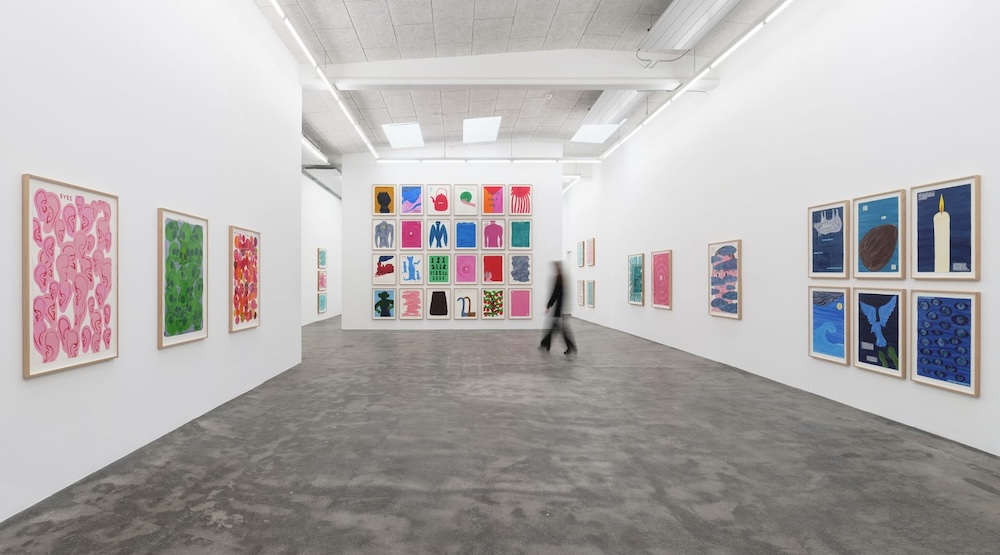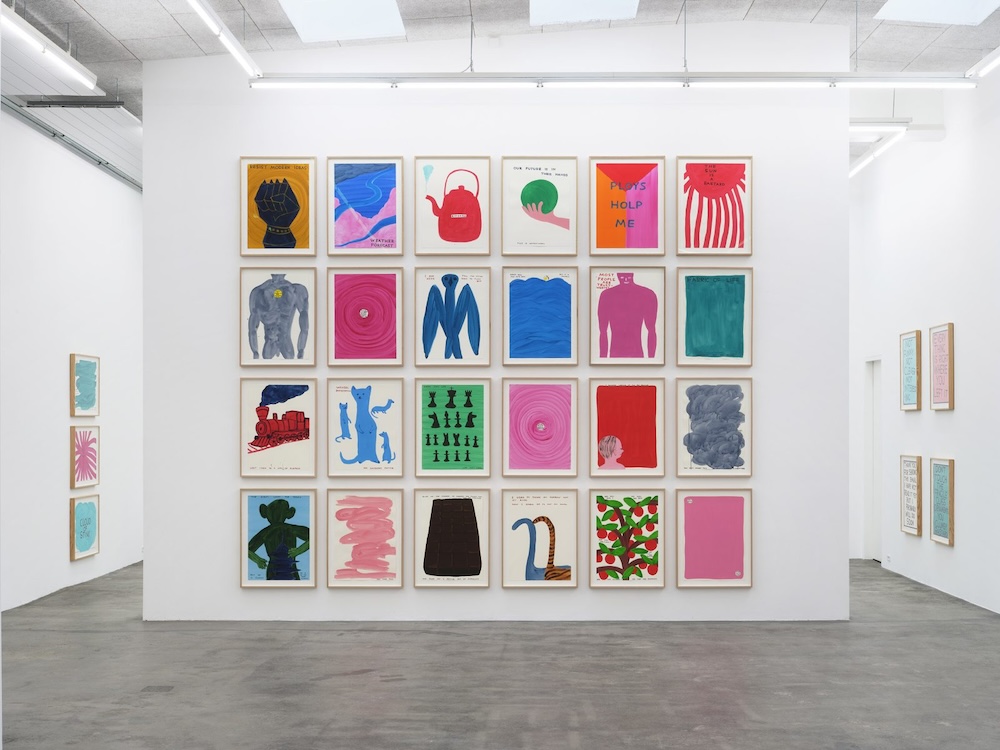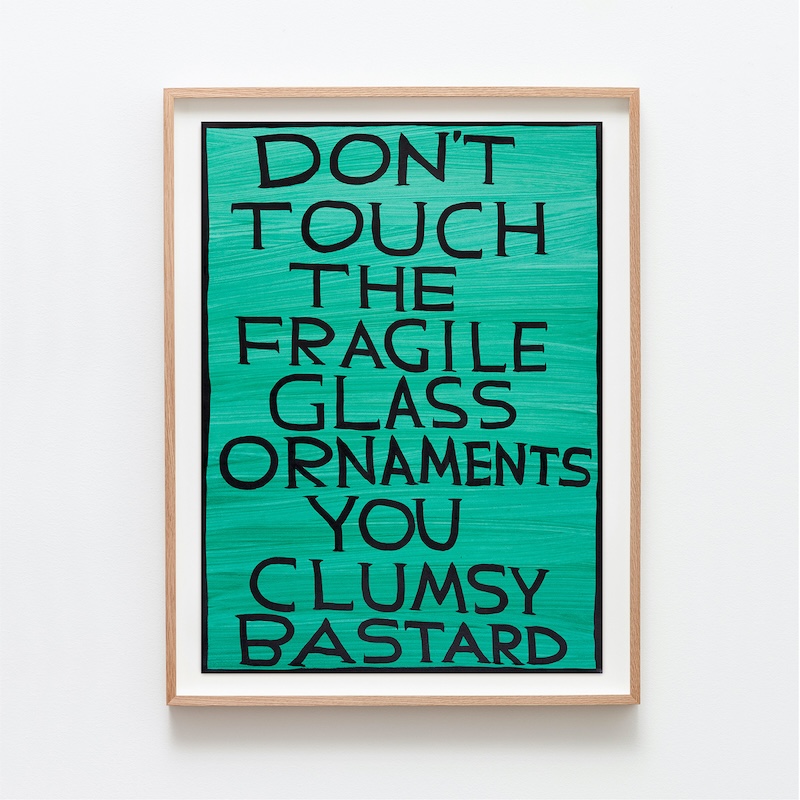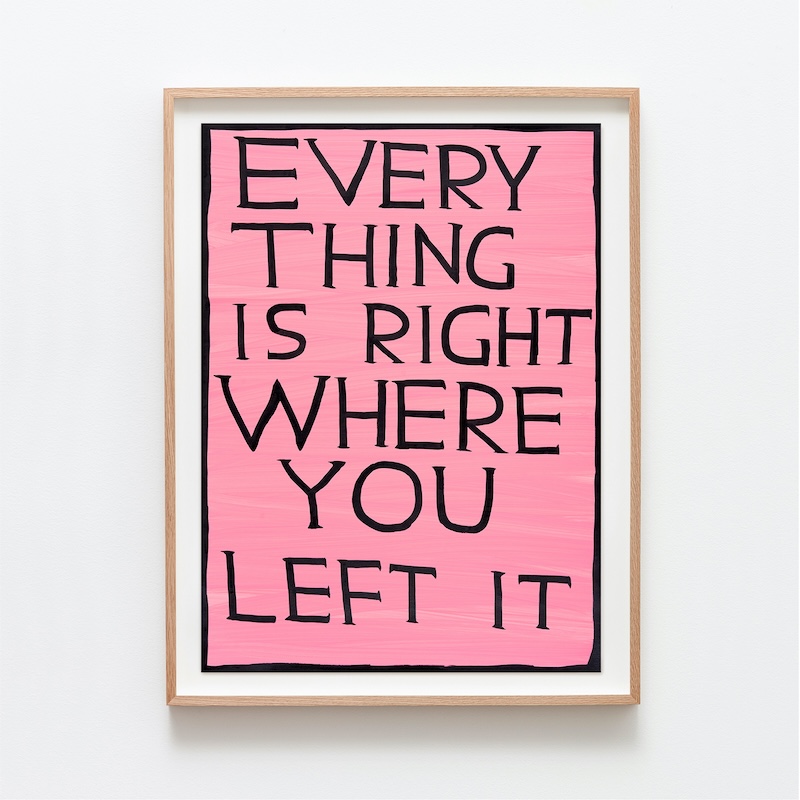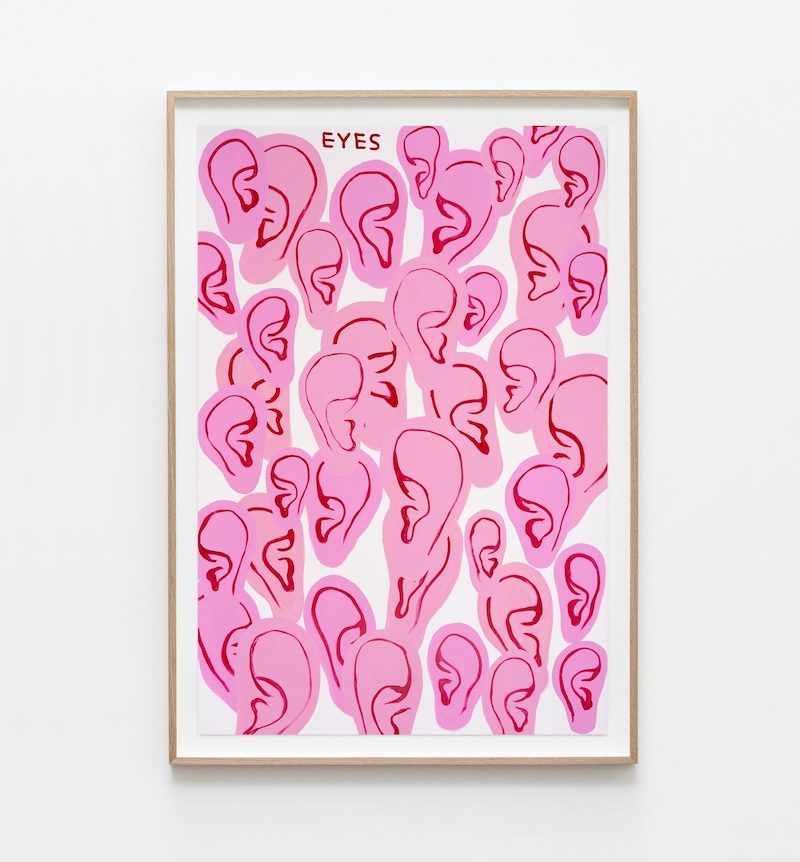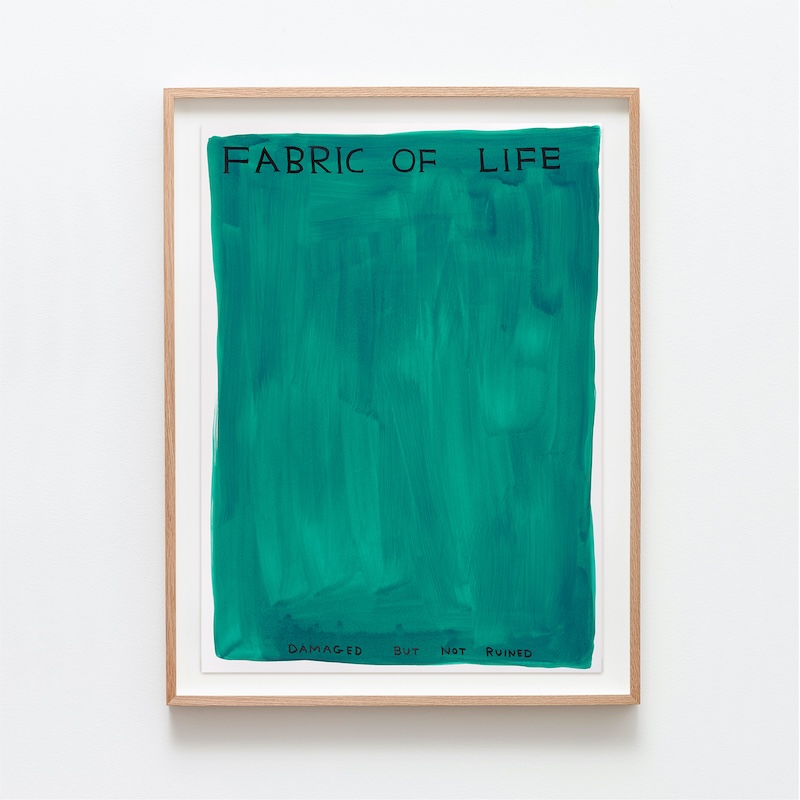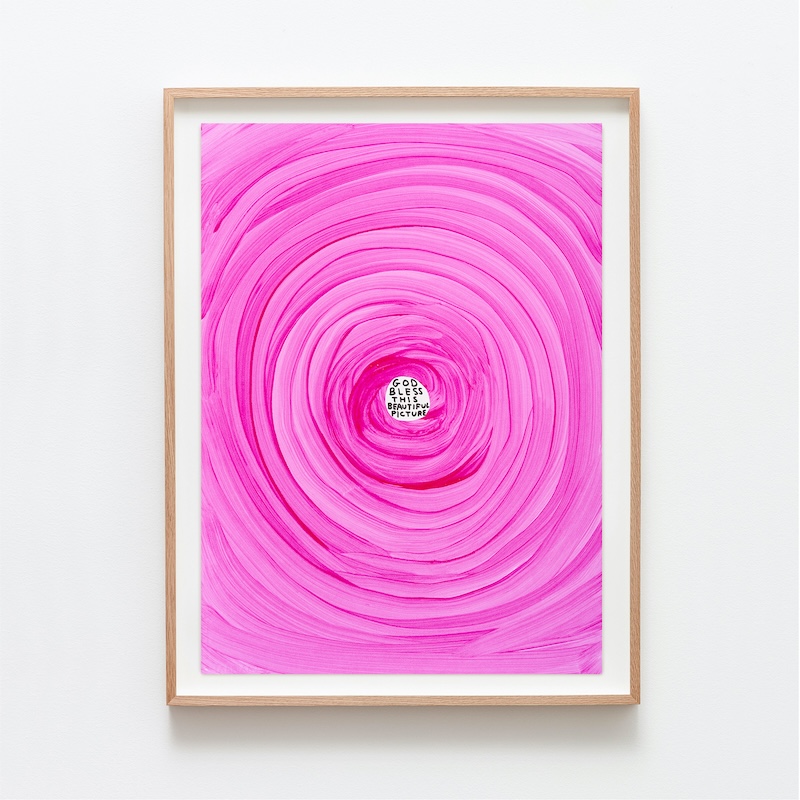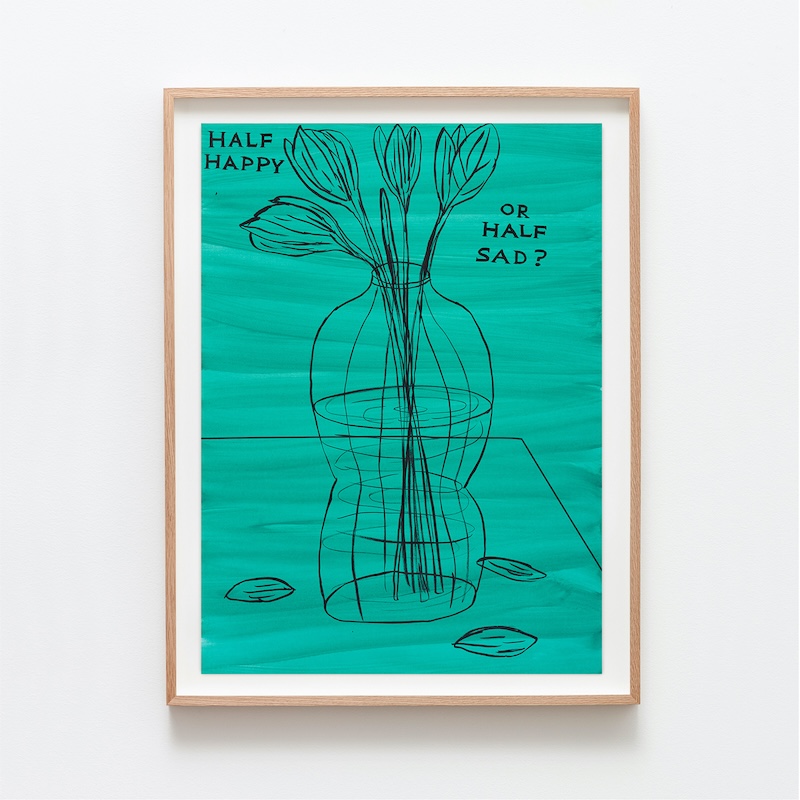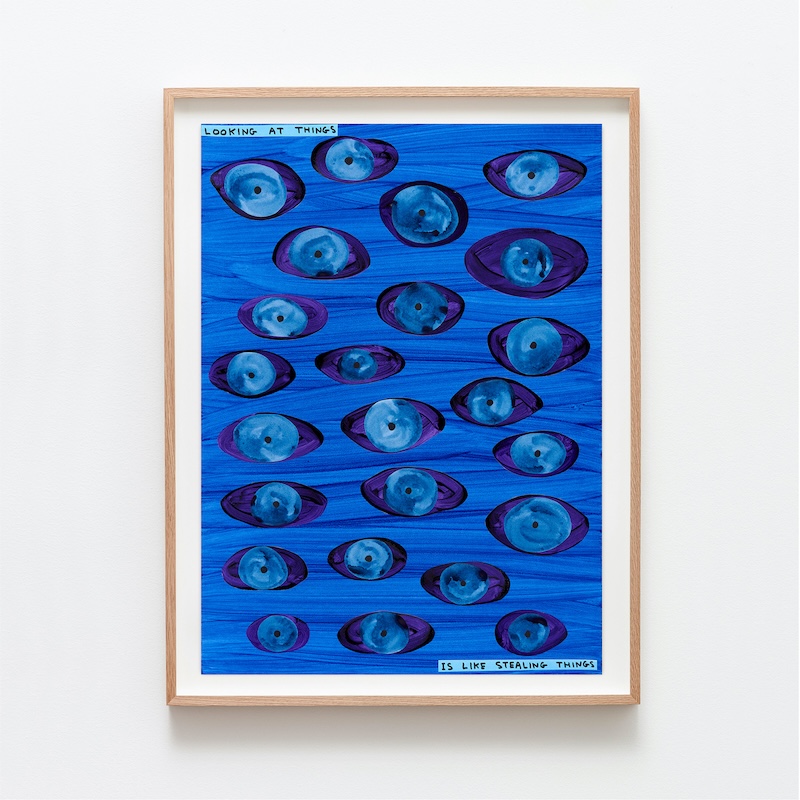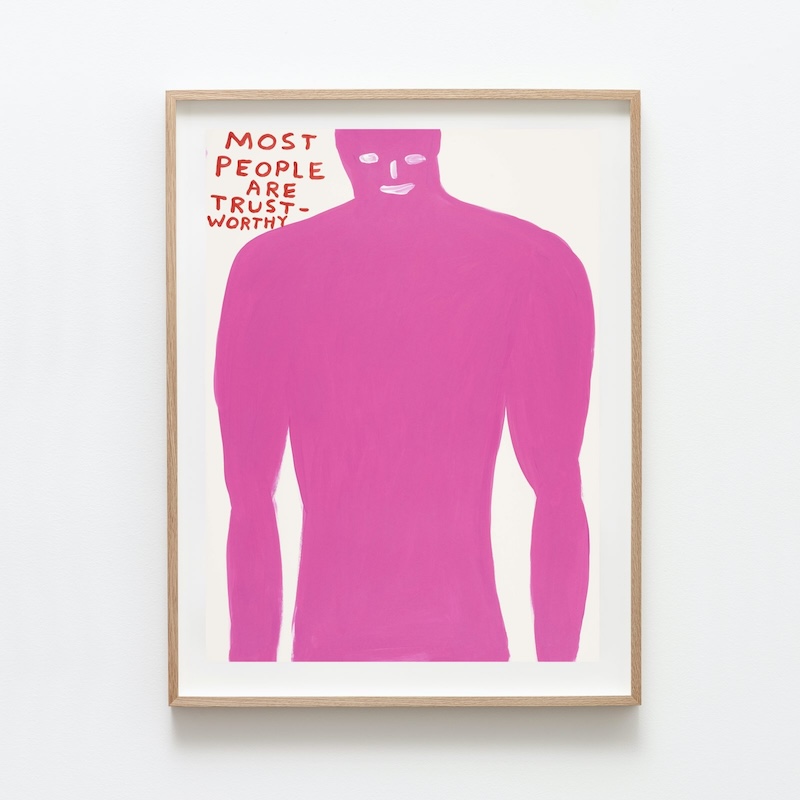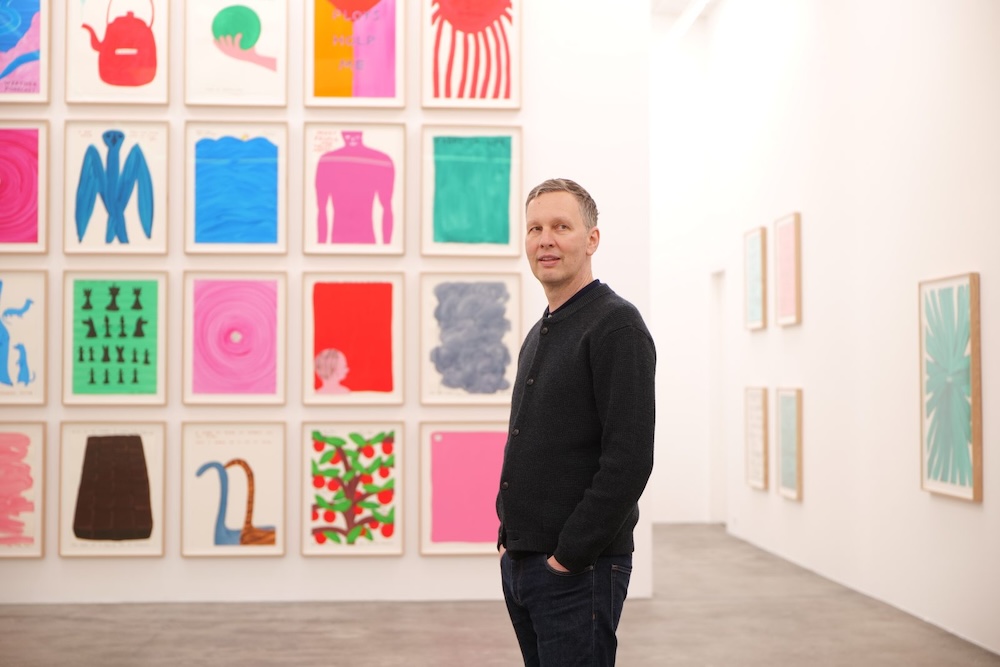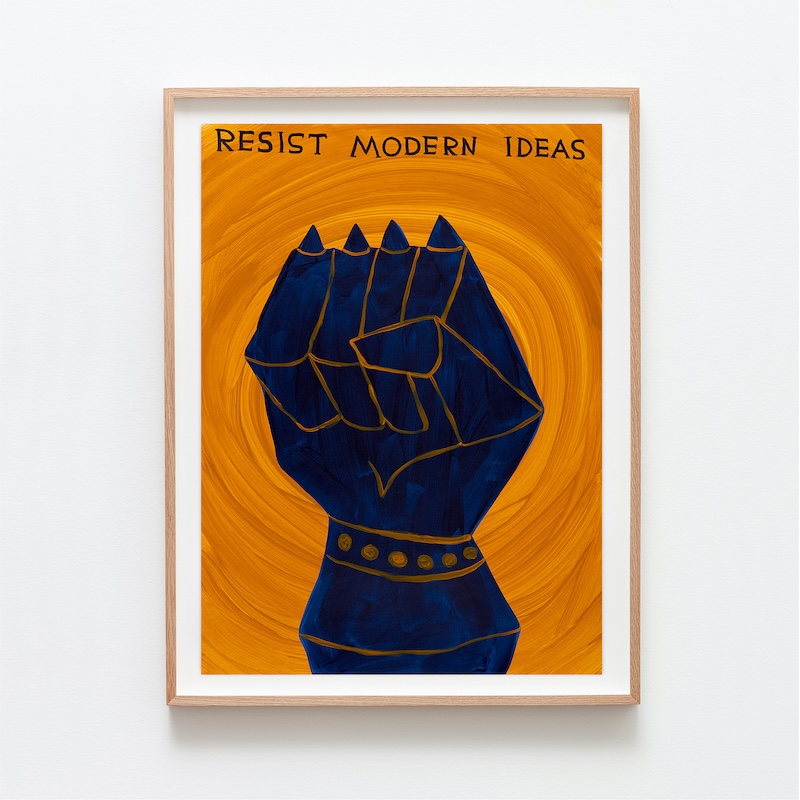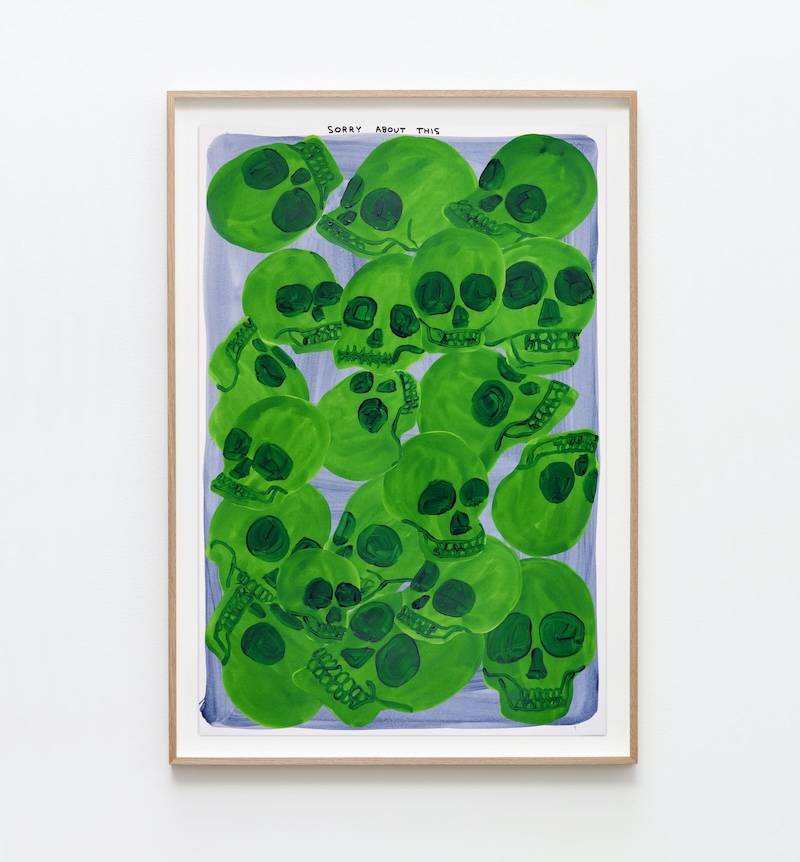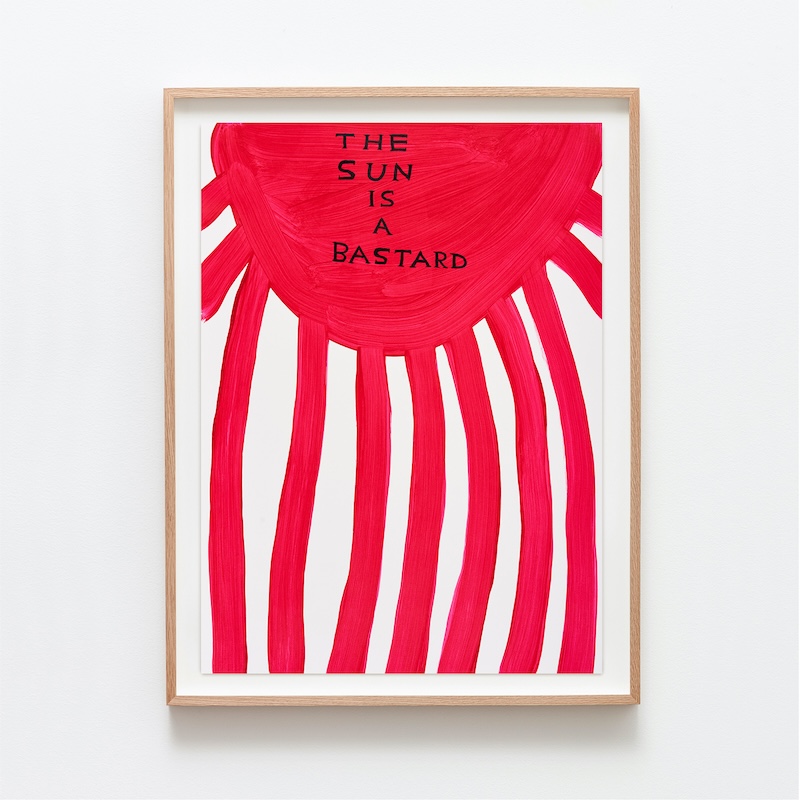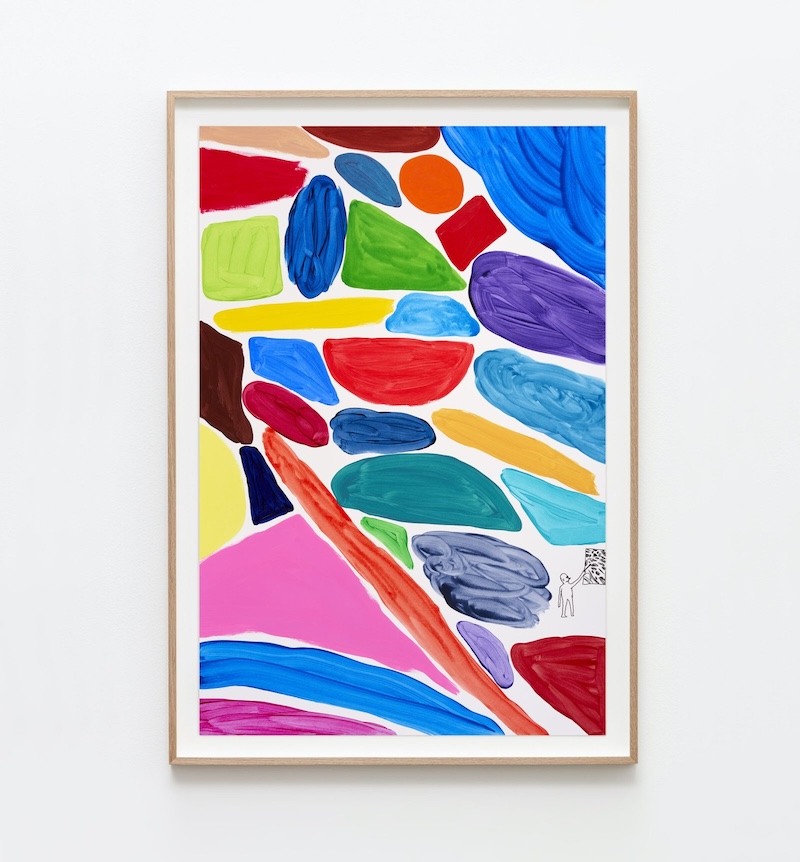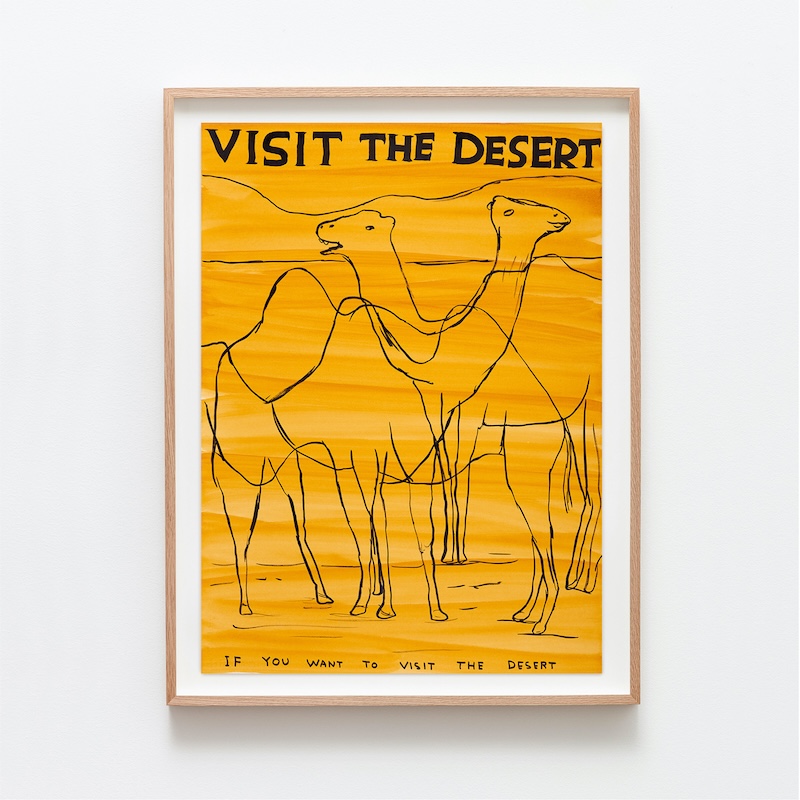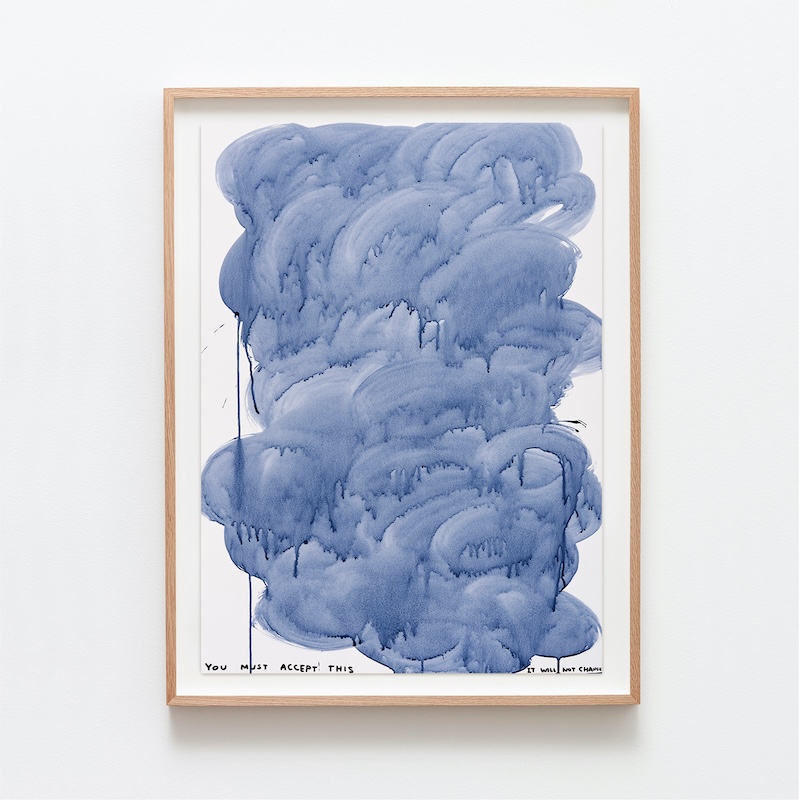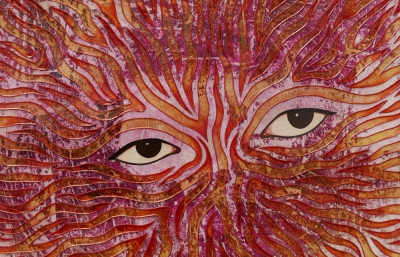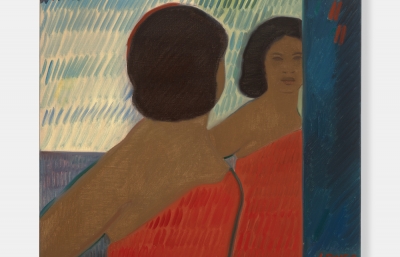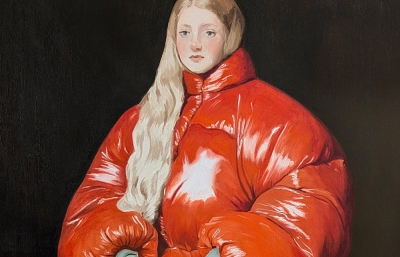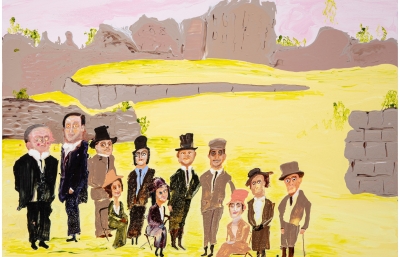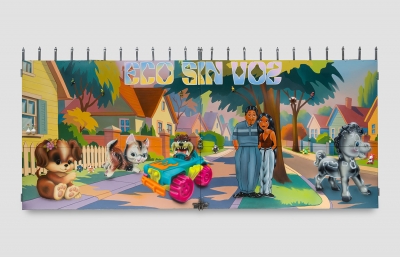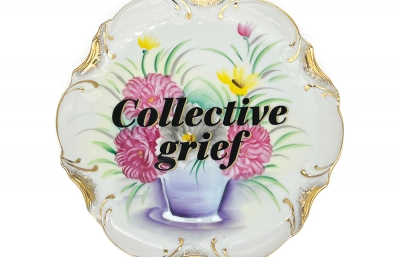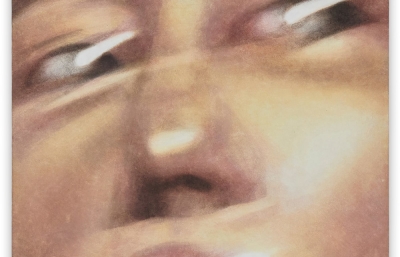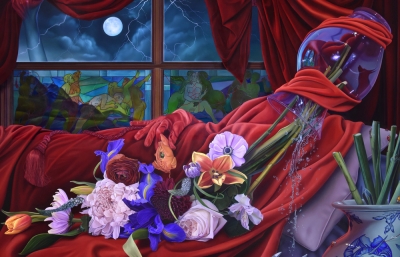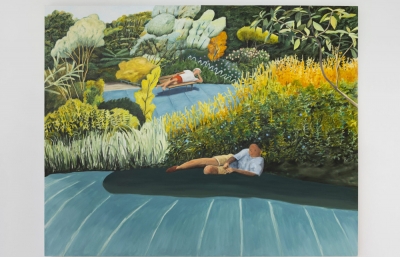It's Friday night, an hour before the opening of his new solo show, People Reveal Themselves Slowly, and David Shrigley is making prints and talking to me on the phone. It's not that he isn't excited about the new work (the first time he has really focused on collage elements in his signature style), he just like to show up to his openings late. Hide in the back, wait for the dinner. But it's always a bit of deadpan humor when David addresses himself, his craft, his large body of work. The Summer 2023 cover artist and internationally renowned maker has a bit of second home in Copenhagen, where his Shrig Shop is located and now his show at longtime gallery Nicolai Wallner will be on view through October 2024. After a busy burst of activity and new products in the shop, Shrigley and caught up and spoke about kombucha, his friendship with Tal R. and the excitement of working in collage and the non-excitement of seeing one's self naked in the mirror.

Evan Pricco: Hello David, nice to speak again. How are you?
David Shrigley: Yeah, I’m all right. Making some prints as we speak, actually.
This seems to be the perfect Friday night-before-the opening-kind-of-action.
Now you mentioned it, yeah. I would rather be here, to be honest, making prints, then at an art opening. I like to be productive.
Well, speaking of productivity, since we have last spoke, you've released the book, Pulped Fiction, had a solo show in New York with Tal R. at Anton Kern, you were in Melbourne for the National Gallery of Victoria's 2023 Triennial, and now you have this show at Nicolai Wallner in Copenhagen. That's quite productive, David,
Oh, yeah, I did the show in New York, and I've got this show then in Copenhagen, and then been making prints this week. I was in Melbourne doing an exhibition… No, I did a lot. But this show, the opening today, was all finished before Christmas. And then, likewise, the show with Anton Kern, that was before Christmas. I did that ages ago. So in a way, I haven't really done anything for a while. So it's quite nice to be making some prints, with some kombucha.
Oh, nice. kombucha. That's the pre-show routine, kombucha?
It is now.
Is that a normal burst of productivity that you like to have, having a bunch of stuff happen at once?
No, it's just a coincidence, really. Like buses, you wait for them for ages, and then three come along all at once.
But usually the three buses that come at once are not the number that you need. It's like three that you don't want.
Yeah, it's like that. Where are you by the way? You are wearing a sweater.
It’s 6:30am in Los Angeles and I wanted to wear proper Zoom attire. You are also in Copenhagen at the Shrig Shop? What's going on with the shop? You have new stuff coming out?
We’re always making new stuff. The hot new product is musical greetings cards, which I'm really satisfied with. I've designed them, well… I met a guy in a bar in Brighton who's in an experimental rock band from the south of France, and we had some things in common, people who we knew in common, and we ended up collaborating on a few musical things. And I said, a few years ago, actually, "Let's do some musical greetings cards. I could do some paintings or some drawings, and you could respond to them with a minute-long piece of avant-garde music."
So my new friend, Regis, came up with six tracks, really instantly, based on these paintings. And then for the next several years, I asked probably about three different people who I make merchandise with, "Let's do some musical greetings cards." And they were like, "No." So I had to start my own shop. And part of the benefit of having your own shop is that this is where you do your own merchandise and you get to do those greetings cards.
How many times, before you had your own shop and before you had a little bit of extra, I would say, notoriety in the art world, did you have ideas in the studio that you thought were great or with a collaborator that you thought were great, and then you brought it out to the world, outside your studio where people were like, "David, what fuck are you talking about?"
Well, no, usually it's just like you bring it to the collaborator and they say, "What the fuck are you talking about?"
Like the greetings card company, for example. I mean, the great thing about having the shop is, usually the criteria or the desire is that it will pay for itself, so it's not really a commercial venture. And even if it doesn't pay for itself, as long as it doesn't lose a lot of money, then it's okay. So that's a really nice way to do business that you don't really care that much, whether it's a commercial success.
I mean, that's the whole premise for the shop, that we can just do stupid things and it'll pay for itself. And yeah, it's nice. I mean, I'm starting to publish my own books with the shop now. I've always wanted to have a shop. The shop itself isn't quite what I imagined, because it's a real shop, right? A real shop selling stuff, and I'm like, "Oh, that whole selling stuff thing gets in the way of having fun with the shop, doesn't it?" So I feel like I probably need to have another shop now that really indulges my conceptual needs where I can have a shop that, I don't know, just sells individual brussel sprouts for wildly varying prices or something like that. So that's kind of what I really want to do in terms of my retail ambitions.
Do you ever go to Copenhagen to just work an hour in your shop?
I'm in there sometimes. When people come in, and the person who's getting paid to work there says, "Oh, this is the artist David Shrigley." And the customer will be like, "What? No, really? Will you sign my T-shirt?" And I'm like, "Yes, I will."
I mean, it is fun. But then again, also the sharp end of capitalism isn't that much fun. It's the possibilities to subvert it, that's exciting, and just to do whatever you want. I mean, a gallery and a shop are really similar, aren't they? The gallery is kind of a shop in a way, most of the time.
It serves a similar function, which is, the goal is to sell.
To sell products. So I think if you just see the shop as being like a gallery, but you call it a shop, then that gives you a lot more possibilities to have fun. As long as you can afford to piss away your money on ridiculous things, as long as you have another income stream, it's fine, as I do. So anyway, shops are good.
I caught the last day, your show with Tal R in New York at Anton Kern. It was quite an inspiring show because you could tell the two of you clearly had a good time making the work. And I wanted to know, as you're talking about all these things with collaboration, Tal R, the musical greeting cards, these collaborations, do you like to be the one to initiate collaborations, or do you also enjoy seeing what comes back to you, and having to respond? Which part of it do you like the best?
Well, I think the criteria for a successful collaboration is that you collaborate with somebody who can't do what you do, and conversely, that you can't do what they do. And that's the recipe for a successful collaboration. I mean, I'm in Copenhagen now, as you know, and Tal's studio is right over there. So if there weren't walls in the way, I could throw a tennis ball into his studio right now. We hang out together quite a lot. This print shop is the same one that Tal uses, and so I’m surrounded by his art.
And so our collaboration is born of sort of just friendship and hanging out. We shared sketchbooks together over the years. And I really like Tal's work, and part of the reason I really like it is he can do something that I can't do, because he's a really amazing colorist and actually a really amazing graphic artist in a way that I'm not.
I think that doing that show was great. It was a shame that he couldn't come. But then again, in a way, it didn't really matter because I see him all the time anyway because I'm here almost every other month making prints. So we had dinner yesterday and I was just in a coffee shop chatting to his wife earlier on. So our lives are very much intertwined.
It was nice for me to install the show, and he was like, "Yeah, just do it. Make it look good." because he couldn't go. So I did it with a couple of people from the gallery, and I really enjoyed it. I really enjoyed that time with his work and spending time with my work. Usually, by that point, as an artist, I always hate my work once I'm installing it. I'm like, "Oh, just take it out of my sight. I don't want to look at it anymore." It's like looking at your own naked body in the mirror. It's just, I don't want to look at it. I know it's there and it's necessary. Some people, well, probably only one person likes it, and not that much.
But looking at his work was just really joyful, just really looking at, on a detailed level, looking at his fingerprints and the exact materials he'd used and the way he'd used them, and it made me really happy.
So the show opening tonight, People Reveal Themselves Slowly, is at your longtime gallery, Nicolai Wallner. You're about an hour away from the opening. What do you look forward to in an opening, or what's your favorite part? Is it the end when you go to dinner?
The dinner is what I enjoy the most. Definitely. But it's an opportunity to see some friends, like people I haven't seen for a bit. But generally speaking, I don't like openings. I don't really like being the center of attention. It freaks me out a little bit. I end up feeling quite exhausted by the end of it. I always hide a little bit, hide in the office. So I sort of try and go as late as I can. And also, I don't know, I'm not going to drink any alcohol tonight.
Is that true? Or is that for the interview?
There is always the opportunity to change your mind, but it doesn't really help, to be honest. It doesn't assuage your discomfort at the experience. But anyway, basically I'm a big guy and I need to be fed. I did have a big lunch…
David, is this age? We are talking about your big lunch!
You had a big lunch, I’m set. I had really nice sushi. I just had a kombucha, which is really nice, actually. Nordic Kombucha.
That's probably pretty good. It's probably very artisanal.
It's nice. I feel that my gut health has really improved in the last...
If you could tell me one thing you're happy about knowing that people reveal themselves slowly, what would it be?
I think just knowing it is important. Just reminding yourself, the first time you meet the person who you thought was an asshole, and then you end up marrying them. It is good to remember that. One tends to make snap value judgments, book by the cover, all that stuff, and it's not necessarily true. But then there's a long term where you know somebody for 10 years and then suddenly you find out they're an asshole, or you thought they were an asshole for 10 years and suddenly you find out he's all right.
I want to end on an asshole, but I also just have one last question. Was the work in this show all made around the same time as the collaboration stuff with Tal R or is this a fresh end of the year push from you 2023?
I worked quite intensely during December getting it all done, because I had to go away to do the show in New York and go to Australia and New Zealand and back here. So I made it all mostly in December and had a bit of help from my friend Coco, who helps me in the studio in Devon. She was helping with the collages, because I think I made collages for the first time, really, over these last few months. So that's been a bit of a departure, but it's still very much my work. They're all painted elements, but collaging just allows you to put light colors on top of dark colors and be creative, which is fun. It allows me to maybe go back to work, so conceive of them differently.
So I delegated it to Coco and she's got really good at it, so that's nice. It's a nice little working relationship. And I can wander around and look at things and scratch my chin, while she's rolling and gluing, and then I can just be moving things around on the paper.
It’s a little bit... what's the word? It is all provisional until it's glued down, which is very different from the way that I do it normally. That's quite interesting and just adds a different aspect to it. But this is the first show of, it's not all collages, but mostly collage and some slightly larger works. So that's good, and it looks pretty good. But like I say, at this moment when I go back there it'll be like looking at my naked body in the mirror, in the hotel room, kind of thing. It's something I just want to ignore. Pretend it isn't there.
David Shrigley’s People Reveal Themselves Slowly will be on view at Nicolai Wallner in Copenhagen through October 27, 2024.



